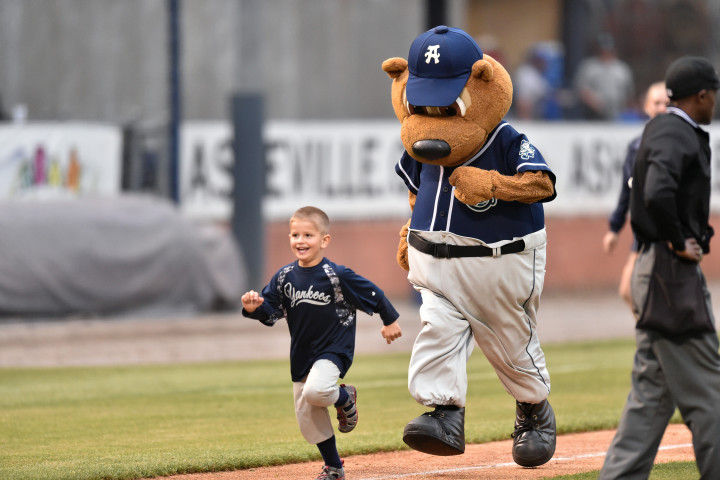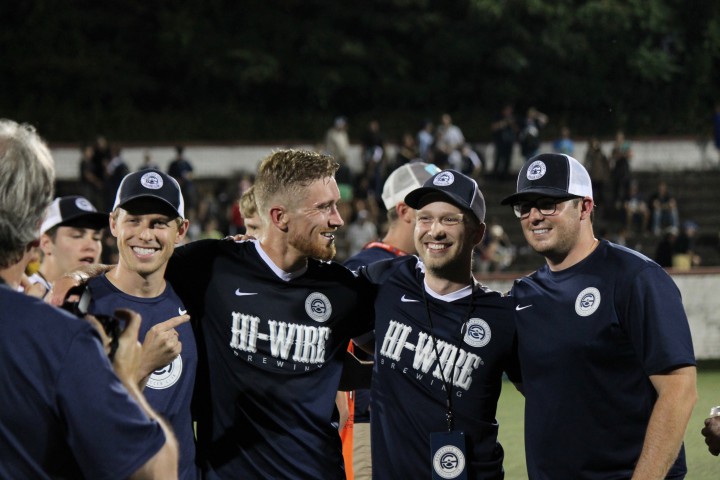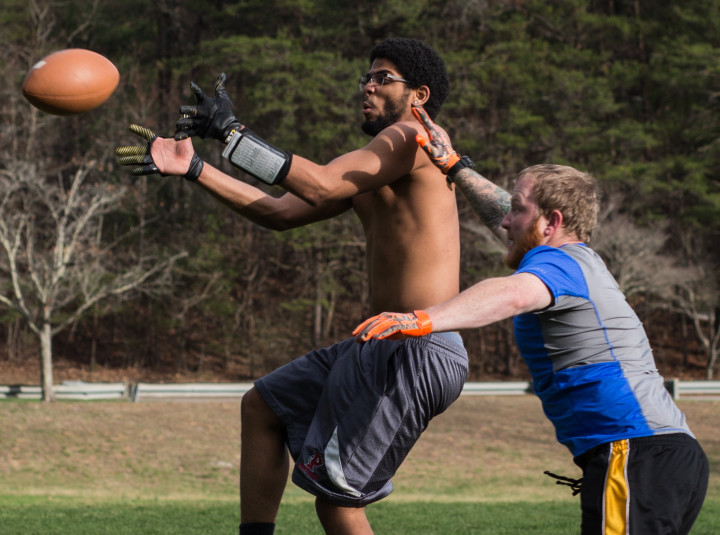“Your shower shoes have fungus on them. You’ll never make it to the bigs with fungus on your shower shoes. Think classy, you’ll be classy.” — Crash Davis in Bull Durham
Minor league sports have never been about glitz and glamour. They’re more about long bus trips and chasing an improbable dream than achieving transcendent glory. Crash Davis, glorified in the movie Bull Durham and perhaps cinema’s most celebrated minor league star, knew this truth well.
Asheville has seen numerous minor league teams come and go throughout the years, but its long-established baseball team is now joined by minor league soccer and football clubs that are redefining the local sports landscape.

The Tourists
Asheville’s most entrenched minor league franchise is named in honor of passers-through. The Tourists are called that because one early 20th-century sports writer keenly noted that none of the players were actually from Asheville. (“It’s just a bunch of Tourists,” he reportedly said.) The baseball team was birthed in 1915, three years after the sinking of the Titanic. The organization has fared much better than the ocean liner, fielding a team each season, minus a four-year stretch (1972-75) in which the Orioles rolled into town and temporarily ousted the Tourists.
The Tourists were re-established in 1976 and immediately reached the Western Carolinas League finals. Not long after the Tourists’ return, a man from Caldwell County named Dorland Winkler purchased season tickets for the first time. He’s been a fan ever since. “I don’t know whether it’s a passion or an obsession,” says Winkler. “I suppose it’s somewhere in between.”
Winkler has sat in more or less the same seat behind home plate since he became a season ticket holder in the early ’80s, though he had to shift one row over after the club made structural changes to McCormick Field several years ago.
McCormick has been the Tourists’ home since 1924, and Winkler believes the park’s storied history has played a pivotal role in the team’s sustained popularity. “The No. 1 draw for the team is McCormick,” he says. “Even though it doesn’t have all the amenities of modern parks, it’s simplistic and pure baseball. Plus, the history here is out of this world.”
Doug Maurer has been the Tourists’ radio announcer since 2010 and has called more than 1,000 Asheville games. He says the first game at McCormick Field was an exhibition between the Tourists and the Detroit Tigers. In the Tigers’ starting lineup that day was Ty Cobb, a baseball legend who broke 90 major league records during his career.
Cobb is not, however, the only baseball immortal to have come through the stadium’s front gates; Babe Ruth, Jackie Robinson and Lou Gehrig also graced the diamond at 30 Buchanan Place. In fact, Bull Durham’s fictional Crash Davis, played by Kevin Costner, hit his record-breaking 247th home run as a member of the Tourists at McCormick Field.
The Tourists’ management is acutely aware of the team’s singular history, embracing it and displaying it for fans. Every door in the ballpark sports a photograph of a former or current major leaguer who walked McCormick Field. Two doors display a list of every major leaguer who has donned a Tourists uniform — a list almost 600 players long.
Winkler, from his spot behind home plate, has watched his fair share of those players, including modern-day major league standouts Juan Pierre (now retired), Matt Holliday, and Ubaldo Jimenez. “I’ll hear people say, ‘Oh, I watched them on TV,’” says Winkler. “And I can tell them, ‘I remember when he was young. I sat with his parents one night at a game.’”
That sense of closeness between fans and players is perhaps the biggest advantage minor league organizations have over their major league brethren. Where, say, the Rockies — Asheville’s major league affiliate — can charge $150 for a seat behind home plate and $10 for draft beer because fans will attend regardless, the Tourists have to be a bit more strategic.
The minor leagues are a much more intimate universe, one where promotions (like the Tourists’ “Thirsty Thursdays”), player accessibility and fan contentment are just as important as the on-field product. “It may be the 120th game of the year for us, but for someone coming to the game that night, it’s their first,” says Maurer. “So we need to treat them as if it were game one for us.”
If recent attendance numbers designate anything, it’s that the Tourists’ appeal is on the rise: They’ve set attendance records in each of the past three seasons, culminating in last year’s high-water mark of 184,019 fans over 68 home games.

Asheville City Soccer Club
The Tourists have set the gold standard for minor league success in Asheville; however, a recent startup, the Asheville City Soccer Club, is hoping to make its own mark.
Last season was the organization’s first, and it saw the club reach the National Premier Soccer League postseason and average 2,000 fans per home game. That number put it in the top five out of 170 teams at its level, and it even outdid several professional teams in major markets.
“That certainly caught the attention of some higher-level leagues,” says the club’s owner, Ryan Kelley.
Like the Tourists, Asheville City SC is mainly a launching pad to lift players into bigger leagues. In fact, Jascha Glueckschalt, who played for Kelley last season, recently became the first Asheville player to sign a professional contract, joining SV Sandhausen in Germany.
Unlike the Tourists, however, Asheville City SC is not affiliated with any major league organization and its players are not paid. Kelley has thus compiled a diverse roster ranging in age from 16 to 27. The core of the team consists of college players who want to compete in a serious summer league, though Kelley also pulls talent from local high schools, adult leagues and even international locales.
Last year, the team suited up players from England, Brazil and Germany. “Our goal is to raise the talent level in Asheville,” says Kelley. “[We’re doing that] by placing the best local players in a highly competitive training and game environment with the best players that we bring in from around the country and the world.”
Asheville City SC management also knows the importance of fan appeal and promotion. Last season, the team offered free authentic jerseys to all season ticket holders. Those jerseys were then used as the fans’ tickets to every home game.
“In 2018, we really want to become a household name in Asheville,” says Kelley. “We want to attract new fans who may not know they love soccer yet.”
New for the Asheville City SC this season will be a women’s team, coached by Stacey Enos, a former national champion at the University of North Carolina and a member of the inaugural U.S. Women’s National Team in 1985.
The women’s team comes highly requested by fans, says Kelley, and it marks the club’s dedication to broadening its appeal and expanding its influence. “We got off to a great start in 2017,” he says. “But if you aren’t growing, you’re dying.”

Blue Ridge Raiders
Minor league football doesn’t get any respect, no respect at all. Just ask Blue Ridge Raiders owner Thomas Arnette.
In the eyes of Arnette — and perhaps many sports fans — minor league football has been in a devolution for many years, morphing into little more than a pickup league played for the hell of it on Saturday afternoons. Most players are forced to supply their own equipment — at a significant hit to their bank accounts — and some have even been allowed to drink alcohol on the sidelines, according to Arnette.
Arnette is trying to rise above that lax culture. He wants his team, which is in its third year, to eventually become as enmeshed in the community as minor league baseball teams and NBA D-League squads — no small task, considering the Raiders, like the Asheville City SC, are not officially affiliated with any major league organization.
“This is a serious team for serious players,” says Arnette. “We’re trying to help guys develop their skills so they can pursue a career, not just meet on the weekends and play football.”
This past season, Arnette helped Raiders alumni Tony Koone and Richard Young get drafted into the Rivals Professional Football League, with each receiving a $1,000 signing bonus. Other players have also used the Raiders as a steppingstone to professional leagues, including overseas leagues and the Canadian Football League, which Arnette considers the top of the mountain for his players. “The CFL would be the biggest opportunity any of these guys would have a shot at making,” he says.
Arnette covers the cost for any combine — football’s version of a job fair — that his players are interested in attending. “I’ll do whatever it takes to get them in front of professional coaches. That’s what we’re here for,” he says.
A number of athletes on the Raiders’ roster were talented high school players who didn’t take the traditional college route for one reason or another — be it injury, trouble with the law or poor grades. Arnette recruits former stars who feel as though they’ve exhausted all their options, yet pine for one final chance to play professionally.
“There are a lot of guys that if they had the opportunity, they could make good money,” says Arnette. “But they’re sitting on the couch, thinking they have no chance because they haven’t gone to college or they don’t want to play for a nonserious minor league team.”
Arnette wants the Raiders to be Asheville’s minor league football team, a source of pride for the city. He’s taking steps in that direction: He signed up the team for the Chamber of Commerce, switched into the Coastal Football Alliance (a league he calls “the real deal”), and struck up an agreement with the Asheville Mall for a pep rally on Feb. 24 to rouse interest in the team prior to its home opener on March 10 at Memorial Stadium.
“A lot of these guys have ability equal to good college players; they just need to get their head straight, for one reason or another,” says Arnette. “This team is made up of young men with something to prove.”



Before you comment
The comments section is here to provide a platform for civil dialogue on the issues we face together as a local community. Xpress is committed to offering this platform for all voices, but when the tone of the discussion gets nasty or strays off topic, we believe many people choose not to participate. Xpress editors are determined to moderate comments to ensure a constructive interchange is maintained. All comments judged not to be in keeping with the spirit of civil discourse will be removed and repeat violators will be banned. See here for our terms of service. Thank you for being part of this effort to promote respectful discussion.